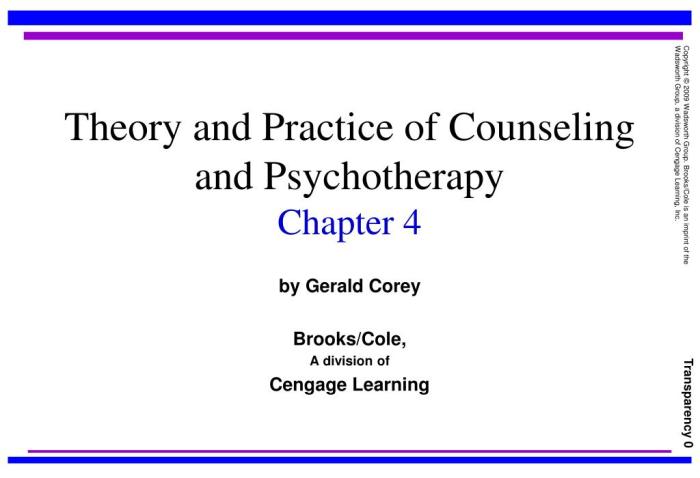Theory and practice of counseling and psychotherapy 9th ed – Theory and Practice of Counseling and Psychotherapy, 9th Edition, provides a comprehensive and engaging exploration of the field, guiding readers through the historical evolution, theoretical foundations, ethical considerations, and practical applications of counseling and psychotherapy. This authoritative text delves into the complexities of human behavior, offering invaluable insights and practical strategies for effective interventions.
With its thorough examination of theoretical orientations, assessment techniques, treatment planning, and multicultural considerations, this book equips students and practitioners alike with a solid understanding of the field. It also explores the use of technology, research findings, and the importance of professional development and advocacy in shaping the practice of counseling and psychotherapy.
Historical Perspectives on Counseling and Psychotherapy

Counseling and psychotherapy have evolved significantly over time, influenced by key figures and schools of thought. Early roots can be traced back to ancient Greece and Egypt, with practices such as catharsis and dream interpretation. In the 19th century, psychoanalysis emerged as a dominant force, followed by the development of humanistic, cognitive-behavioral, and systemic approaches in the 20th century.
Timeline of Significant Events and Milestones, Theory and practice of counseling and psychotherapy 9th ed
- 400 BCE: Hippocrates emphasizes the importance of the mind-body connection in health and well-being.
- 1882: Wilhelm Wundt establishes the first psychology laboratory, marking the beginning of modern psychology.
- 1895: Sigmund Freud publishes “Studies on Hysteria,” laying the foundation for psychoanalysis.
- 1930s: Humanistic psychology emerges, emphasizing the individual’s potential for growth and self-actualization.
- 1950s: Cognitive-behavioral therapy is developed, focusing on the role of thoughts and behaviors in mental health.
- 1960s: Systemic therapy gains prominence, recognizing the importance of family and social systems in individual functioning.
Theoretical Foundations of Counseling and Psychotherapy
Various theoretical orientations provide frameworks for understanding and addressing mental health issues. Each orientation has its own set of assumptions, concepts, and techniques.
Psychodynamic Approach
Focuses on unconscious processes and early childhood experiences. Key concepts include transference, resistance, and free association.
Humanistic Approach
Emphasizes the individual’s potential for growth and self-actualization. Key concepts include unconditional positive regard, empathy, and genuineness.
Cognitive-Behavioral Approach
Targets the relationship between thoughts, behaviors, and emotions. Key concepts include cognitive distortions, behavior modification, and exposure therapy.
Systemic Approach
Views individuals within the context of their relationships and social systems. Key concepts include family dynamics, communication patterns, and social support.
Ethical and Legal Considerations in Counseling and Psychotherapy: Theory And Practice Of Counseling And Psychotherapy 9th Ed
Ethical guidelines and legal responsibilities govern the practice of counseling and psychotherapy to protect clients and ensure ethical conduct.
Ethical Principles
- Beneficence: Promoting client well-being.
- Non-maleficence: Avoiding harm.
- Autonomy: Respecting client self-determination.
- Justice: Ensuring fair and equitable treatment.
Legal Responsibilities
- Confidentiality: Protecting client information.
- Informed Consent: Obtaining client agreement before treatment.
- Dual Relationships: Avoiding conflicts of interest.
Assessment and Diagnosis in Counseling and Psychotherapy
Assessment plays a crucial role in understanding client needs and developing effective treatment plans.
Assessment Tools and Techniques
- Interviews: Structured or unstructured conversations to gather information.
- Psychological Tests: Standardized measures to assess personality, cognitive functioning, and mental health.
- Observational Methods: Observing client behavior in various settings.
Differential Diagnosis
The process of identifying the most likely diagnosis based on assessment findings, considering multiple possible diagnoses and ruling out alternative explanations.
Clarifying Questions
What are the key theoretical orientations in counseling and psychotherapy?
The major theoretical orientations include psychodynamic, humanistic, cognitive-behavioral, and systemic approaches, each with its unique assumptions, concepts, and techniques.
How does cultural sensitivity impact counseling and psychotherapy?
Cultural factors significantly influence mental health and well-being. Counselors and psychotherapists must be culturally competent to effectively work with clients from diverse backgrounds.
What is the role of technology in modern counseling and psychotherapy?
Technology, such as teletherapy and virtual reality therapy, offers new opportunities for delivering counseling and psychotherapy services, expanding access and flexibility.